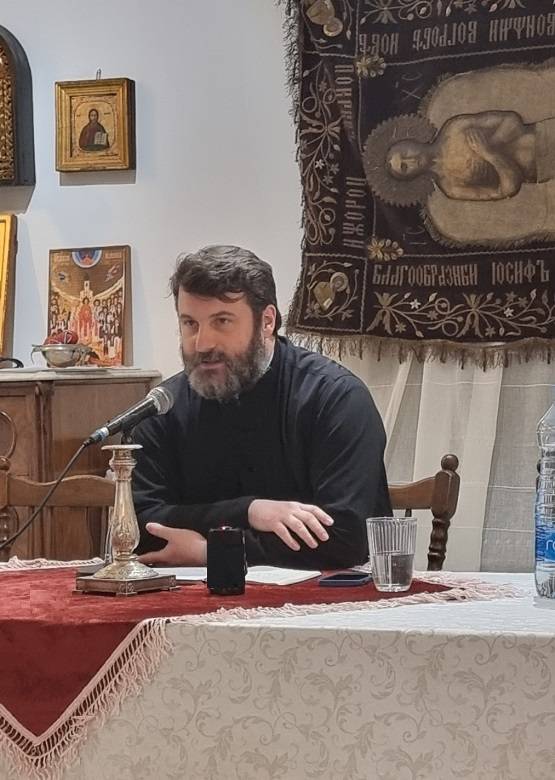
FATHER IGOR BALABAN: JUSTICE CAN ONLY BE FOUND IN THE KINGDOM OF GOD
Hunger and thirst for justice can only be satisfied in one place, in the Kingdom of God, said Archpriest Igor Balaban, the hierarchal vicar of Zeta.
In the Treasury of the Serbian Orthodox Church of Kotor, as part of a series of lectures during Great Lent organized by the Serbian Orthodox Church Municipality of Kotor, Father Igor yesterday gave a lecture entitled “Blessed Are Those Who Hungry and Thirst for Justice”.
He recalls at the beginning the words of the Lord that He spoke on Mount Sinai.
“First, the Lord says that many are blessed, and then he lists: blessed are the merciful, the poor in spirit, the peacemakers, those who are persecuted for the sake of justice, and blessed are those who hunger and thirst for justice”. Therefore, blessed in this evangelical sense, in which the Lord speaks, are those who are blessed.
Such, not only are blessed by such their disposition and that such their disposition is blessed, but such is their disposition, the one that introduces them into the Kingdom and that the Lord accepts and recognizes as his sons and daughters. Therefore, this is blessedness in the evangelical sense. Blessedness means that he, she, that they have become a resident of the Kingdom of Heaven by what they have done and by what they have done. Therefore, blessed are those who hunger and thirst for righteousness. Why are they blessed, that is, what is important to them?
Why does the Lord mention hunger, thirst, and righteousness here, as in many other places in the Gospel? Besides the fact that it was considered interesting to hear about this bliss and justice, the justice for which we all cry out at every moment of our lives, the whole world and entire societies, once entire classes, today some other parts of society cry out for that justice. Besides, it is good to hear, it is also good that in these days of fasting we talk about hunger and thirst. Why and what connection do this hunger and thirst for justice have with this our fleshly hunger and thirst? Is there any correlation between them? Or do they have no connection at all? Of course, the Lord does not use the expressions hunger and thirst by chance. Hunger is a characteristic of fallen man,” says Fr. Igor.
Our physical hunger, he emphasizes, can never be satisfied.
“In fact, this satiety lasts very briefly. Only a few hours. Or, if someone is not very hungry, it can last for a day. But no more than that. Our physical hunger, and especially thirst, requires constant and constant satiation, constant and constant satiation and filling of the body with what can satisfy that hunger. Thus, the characteristic of fallen man. Remember that Adam and Eve, as the biblical account tells us, were allowed to eat from every tree in the Garden of Eden except one. Then we say that fasting, therefore hunger, overcoming hunger, fighting hunger, fasting, is one of the first commandments of the Lord. The Lord planted, created people, created man and one of the first things He tells him, one of the first commandments He gives him is to fast, to abstain from certain foods. There, that food is called the Tree of Knowledge of Good and Evil,” says Father Igor.
He also reminds us that even then, man breaks God’s commandment, does not listen to Him, does not follow His word, but follows his own lust.
“Our forefathers did this. They followed their own intellect, and not God’s, well-intentioned, parental word. The violation of that commandment, such our wrong attitude, produced what is called in the Gospel the lust of the flesh, the lust of the eyes, and the pride of life. This is how the Gospel tells us about our nature. Which reality is enslaved by these lusts and this pride.
Everything we see, we want to possess. Everything that is around us, above everything that is around us, we want to rise, we want to be first, we want to have more than everyone else. We want the best food, to have the best house, an even better car than we have, and it is a struggle, a daily struggle for each of us to fight with it. Of course, we are rational enough to know that we cannot achieve everything we need in the given circumstances, but that does not prevent us from cultivating within ourselves the feeling that something is unfair. That this world is unfair to us. That our lives should and must be better and that God Himself, if we get angry enough, will declare Him unjust because He gives to others and does not give to me. Do you remember that story about those workers who came, some at dawn, and some at the eleventh hour,” he says. o Igor.
Our concept of justice, he adds, is “quite slippery to say the least.”
“The concept of God’s justice is very comprehensive. When the Lord Himself speaks of justice, He does not always mean what we think of it. Justice and almsgiving and not exalting others are an integral part of fasting, and thus they are also an integral part of the suffering of those who hunger and thirst for justice, as the Lord says, and that is all of us - some of us, who want to be blessed, or at least we try, or at least we think we are on that path, we really try to reach that right. Then, in our societies, in our environment, in our family, we try to do so. We cannot make this world become the Kingdom of God, but we can try not to make it become only misery and hell. If we try to do so, if we really thirst and hunger for justice to reign in the world, God promises us that we will be blessed and also tells us that we will be satisfied.
Even when this righteousness, which we usually we mean that everyone has the same, or at least approximately the same, or at least that everyone has according to their merits, if nothing else, then this justice that we also imagine to be very important, and it is, so that man does not become a wolf to man, then justice that the judge judges according to justice and judges, not under bias, not because of some inconstancy of his own, but to judge as he should be judged, to give everyone what is according to the law, then the justice of those who distribute common goods, the government, ministers, so we believe that there should be justice there too, that they know how it is distributed. All this is good and useful and it is commendable that we constantly fight for such a kind of justice, that we constantly seek it in the world. It is, after all, natural. We want such justice”, says Fr. Igor.
The thirst for justice on earth is insatiable.
“Or rather, it is unattainable. We cannot reach it. Civilizations have changed and civilizations have changed. They have been both this and that. Some have tried, through violence, dictatorship, to achieve some ideals, or an ideal society, as they imagined it. Some have tried, as most countries are trying today, to achieve the ideals of that justice through greater citizen participation, through some popular will. But we know, we see it every day in every place in every institution, that this is not happening. The entire human experience speaks of the fact that final, absolute, and ideal justice is unattainable here among us. If so, then how and what does the Lord expect of us? What should we do. Does He expect us to hunger and thirst in vain for justice that we know will never be realized? Is all our hunger and thirst in vain and how will we then be satisfied? What will happen? Of course, the Lord Himself knows and teaches us and knows that we cannot be satisfied with earthly food, and unfortunately we cannot be satisfied with, and these are serious passions, neither with silver, nor with wealth, nor with power, nor with our pride. We can never be satisfied with that. But the Lord promises us that if you strive to keep your energies, your being, your soul from striving for wealth, power, greed of every kind, for earthly passions, if you do so and if you suffer, because hunger and thirst are a kind of suffering, if you suffer for justice, I tell you that you are blessed and that you will be satisfied,” says Father Balaban.
He believes that justice is in the context of God.
“The justice that the Lord mentions so much is more sublime than the justice that can be brought to us by some significant and important institutions that we have created here for ourselves, in order to organize our lives, so that we do not tear each other’s heads off without order and without discipline. The justice that the Lord speaks of is something much more than that. The justice that the Lord speaks of is He, God Himself. How do we know this? Well, we know because the Lord speaks of Himself many times as the bread with which we will be satisfied. He says that He Himself is the bread of heaven. He says that He Himself is the living water, which quenches our thirst, which fills our soul. That is He Himself,” says Father Balaban.
It also reminds us of the Lord's words that we will not wait for justice.
“And he says, blessed are you who hunger and thirst for justice. Not you who have received justice, blessed are you. But blessed are you who hunger and thirst for justice and he also says, he adds in the next and also the last beatitude, blessed are those who are exiled for justice’s sake. So he says blessed are you when they persecute you and lie, lying against you with all kinds of evil words. You are blessed, such are you blessed. So it is not easy and that is clear to us. Life is complicated for those who want to walk in God’s way. We sometimes twist our perspective, unfortunately, and then we pray to the Lord. We turn everything upside down and say: “because I pray to you because I fast twice”… Do you remember that story about the tax collector and the Pharisee. That Pharisee came before God and said I fast twice a week I give a tenth of all that I acquire, I do this, I do that. And he He expects as in trade. He expects to be returned for it. And that tax collector only beats his chest and says, God, be merciful to me, a sinner. If we approach such a trade business, let's say I have offered to You, what do You want from me, God, I have given You a fast, here is Your fast, I give alms to some people there, I work hard on this and that. I do not commit any sins from these commandments that You gave to Moses. I work hard, and You do not give me justice. You do not let me achieve it in this world. What kind of person are you? Well, he is certainly not a trader, just as a parent cannot trade with his children. A parent can educate his children. He can apply various pedagogical measures to his children, but he cannot and will not love his child more or less because he did this or that. He may not talk to him, but that has nothing to do with each other. The Lord may become angry. It says in the Holy Scriptures, “the Lord became angry.” He became angry, but not as a boss or as an executioner, but as a father. He became angry as a father. Precisely to show us where we should seek justice. To seek it where we can only reach it because we will be satisfied. That is how this bliss ended. Justice and the hunger and thirst for justice are satisfied only in one place, and that is in the kingdom of God. There is no other place where we can be satisfied and quench our thirst,” said Fr. Igor.
He concludes that the satisfaction of all our hungers, all the injustices that we have experienced, all the injustices that the world has ever experienced and all our ancestors and all our descendants who will experience, all these injustices will be “ironed out” by the Lord.
“And He promised that He would do it. That does not mean that we do not have to denounce the injustice of this world. We also have the right to denounce injustice. We did that very loudly a year ago, you remember, and everyone watched us denounce it and fight against it because it threatened all of us together as a community and as a Church. But that does not mean that we gave in and hoped that it would solve, as we know it did not, all our problems. There was once an ideology here, which at least in words wanted to achieve justice and equality, inspired by the same ideology in another great country, leaving millions and millions, and here tens and hundreds of thousands perhaps, violently murdered, because justice cannot be achieved through violence. They did not achieve it, because it cannot be achieved through violence. That is why we should walk in this life hungry and thirsty for heavenly justice, and trying to be less satisfied with earthly goods. Earthly goods are for our use and useful and necessary for life, but we must not dwell on that, but should always listen to the voice of our heart and the voice of our soul. The heart and soul, when a man is left alone with himself, will always unerringly say, "You are created for more," said Fr. Igor.
Next Thursday, Fr. Makarije from the Savina Monastery will be a guest at the Treasury.
PHOTOS
RELATED ARTICLES
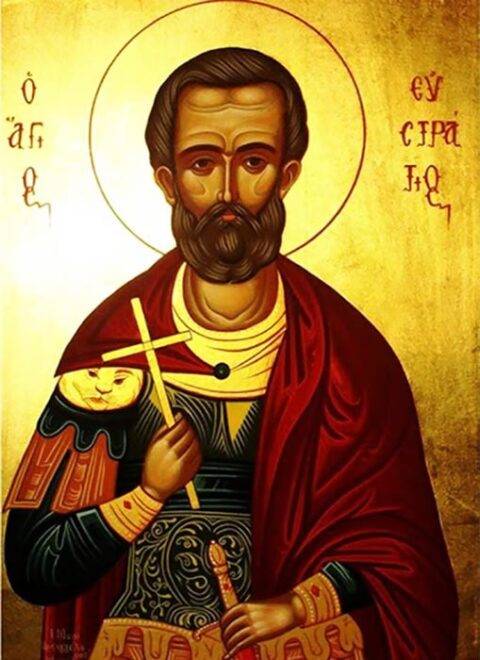
Calendar for April 10 The Holy Martyr Eustratius of the Caves
The Holy Martyr Eustratius of the CavesA very rich man, moved by the love of...
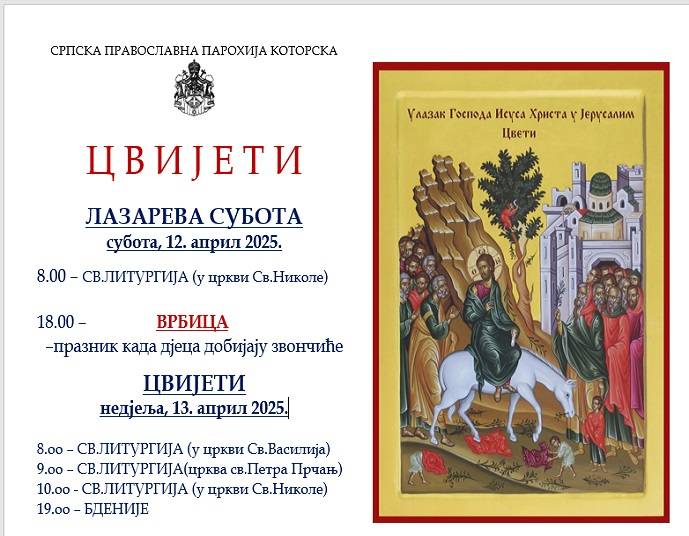
LAZARUS SATURDAY AND CVIJETI SATURDAY SERVICES
LAZARUS SATURDAYSaturday, April 12, 2025 8:00 AM – HOLY LITURGY (in the...
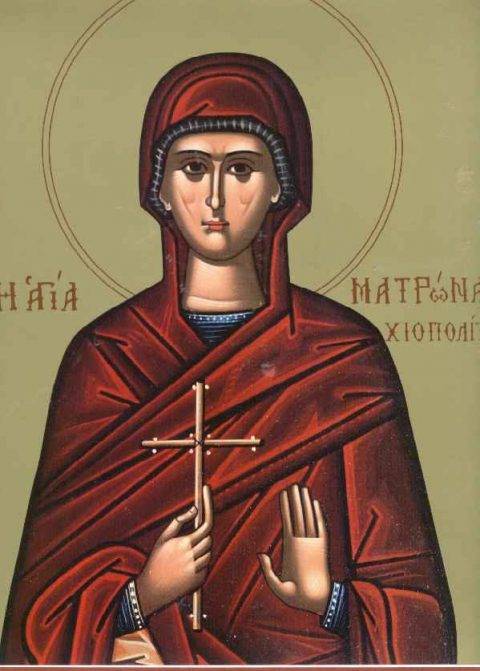
Calendar for April 9 Holy Martyr Matrona of Thessalonica
Saint Matrona, as a poor girl, was a servant in the house of a Jew in...


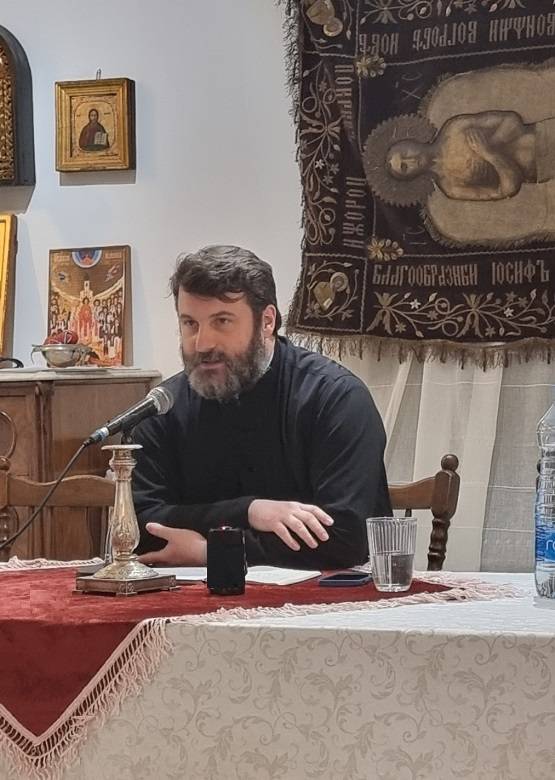

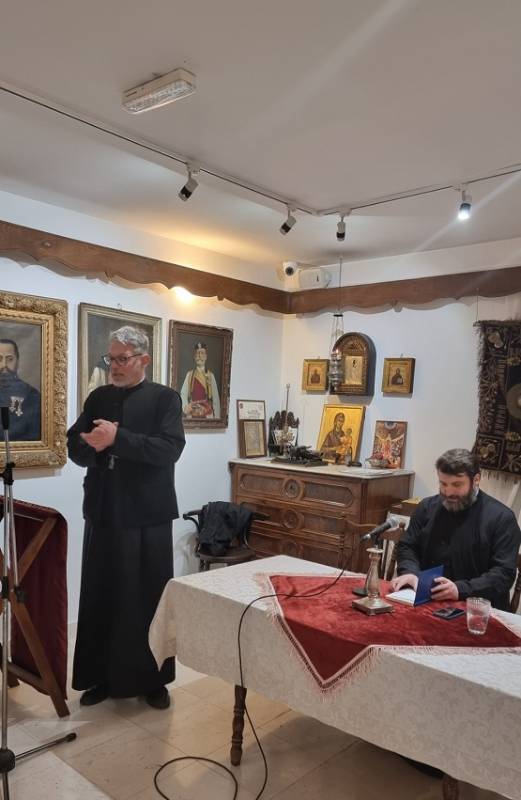
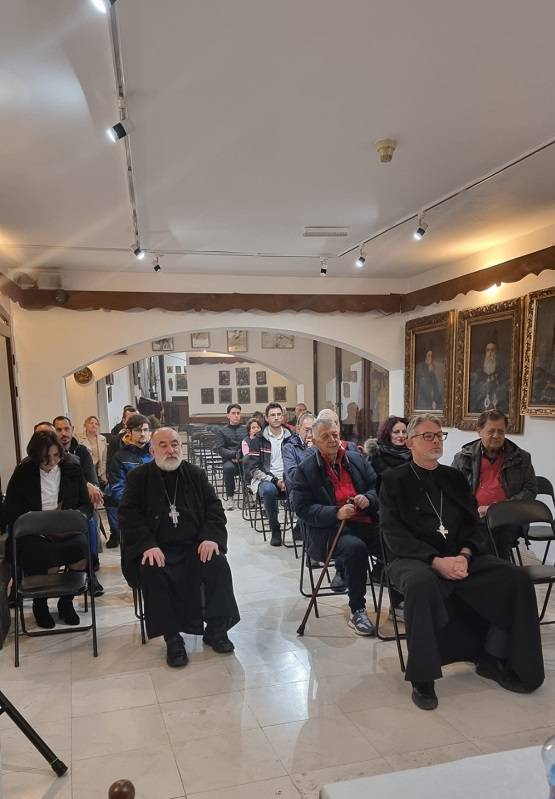

.png)